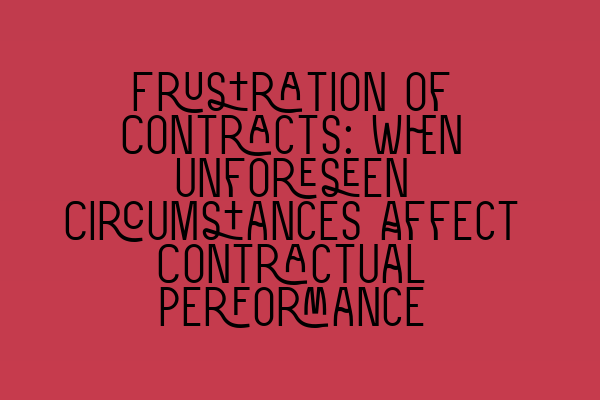Frustration of Contracts: When Unforeseen Circumstances Affect Contractual Performance
Contracts are the backbone of business transactions, ensuring that both parties fulfill their obligations and receive the benefits they agreed upon. However, there are situations where unforeseen events can occur, making it impossible for one or both parties to perform as originally intended. This is when frustration of contracts comes into play.
What is Frustration of Contracts?
Frustration of contracts is a legal doctrine that allows parties to be relieved from their contractual obligations when an unforeseen event occurs, rendering the performance of the contract impossible, illegal, or radically different from what was originally anticipated. It serves as a safety net when circumstances beyond the control of the parties make it impractical or unjust to enforce the contract as it was originally agreed upon.
For example, imagine a scenario where Party A and Party B entered into a contract for the sale of a vintage car. However, before Party A could deliver the car, it was completely destroyed in a fire. In this case, frustration of contracts may apply, as the occurrence of the fire made it impossible for Party A to perform their obligation of delivering the car.
Requirements for Frustration of Contracts
In order for frustration of contracts to be invoked, certain requirements must be met:
- Unforeseen Event: The event must be unforeseeable at the time the contract was formed. If the event was reasonably foreseeable or within the contemplation of the parties, frustration may not apply.
- Impossibility or Radical Change: The event must render the contract impossible to perform, illegal, or fundamentally different from what was originally intended. It is not sufficient for the contract to simply become more burdensome or expensive to perform.
- No Fault of Either Party: The frustrating event must be outside the control of both parties. If one party caused the event or could have foreseen and prevented it, frustration may not apply.
- Not Self-Induced: The frustrating event must not be the result of the party seeking to rely on frustration. If the party played a role in causing the event, they cannot claim frustration to avoid their obligations.
Effects of Frustration of Contracts
When frustration of contracts is successfully invoked, it has the effect of automatically discharging the parties from their obligations. This means that neither party will be held liable for non-performance, and any payments made in advance may be recoverable.
However, it’s important to note that frustration does not automatically result in the termination of the entire contract. If the frustrating event only affects a portion of the contract, the remainder may still be enforceable.
Case Examples
There have been various cases where frustration of contracts has been invoked. One notable example is the case of Taylor v Caldwell (1863), where a music hall was destroyed by fire before the scheduled performance. The court held that the contract was frustrated, as the destruction of the venue made it impossible to hold the concert.
Another relevant case is Davis Contractors Ltd v Fareham Urban District Council (1956), where a contract for the construction of houses was frustrated due to government-imposed restrictions on building materials. The court held that the contract was frustrated, as the necessary building materials were no longer available at a reasonable cost.
Conclusion
Frustration of contracts is a crucial legal doctrine that provides relief to parties when unforeseen events make it impossible or radically different to perform their contractual obligations. Understanding the requirements for frustration and its effects is essential for both businesses and individuals engaged in contractual relationships.
If you are studying for the SQE exams, check out our related articles:
